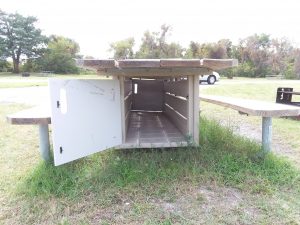
BERLIN – In an effort to protect the wild horses at Assateague Island National Seashore, a new campaign is aimed at keeping them away from human food.
This week Assateague Island Alliance, the friends group that supports the national park, launched the “A Fed Horse is a Dead Horse” campaign. The project is a multi-faceted approach to preventing Assateague’s wild horses from accessing food campers bring into the park.
“We really need to get the message across to people,” said Ashlie Kozlowski, outreach coordinator for Assateague Island Alliance (AIA). “Food needs to be locked up and kept away from wildlife.”
Less than three months ago, the wild horse known as Chama Wingapo died after eating a large amount of dog food. The rich food caused an impaction that resulted in the rupture of Chama Wingapo’s intestine.
To prevent similar incidents, AIA has launched its new campaign to remind visitors that “a fed horse is a dead horse.” In addition to sharing that message, AIA will be helping to install wildlife-proof picnic tables as well as fencing at campgrounds throughout the park. The group will also be distributing nylon straps so campers can secure their coolers.
Kozlowski said staff at the national park had developed a prototype of a picnic table that featured a built-in storage compartment that food could be kept in. Though the prototype is already in place in one bayside campground, AIA wants to raise $50,000 so that every picnic table in the park to be replaced with one of the wildlife-proof models.
While the group will be applying for some grants to help fund the unbudgeted expense, Kozlowski says some of the funding will come from the “Name that Foal” contest coming up Oct. 20. As it has in the past, AIA will auction off the naming rights to a foal in an eBay auction that will run from Oct. 20-29. The highest bidder will win the right to name N9BM-JO, the foal born at Assateague in November 2016.
In addition to the new picnic tables, AIA also has plans to replace damaged fencing around the Oceanside Walk-In campground. While the fence there has been effective in keeping horses from accessing campers’ food, portions of it are damaged and in need of repair. The group’s volunteers will also be distributing cooler straps to visitors who don’t have their gear properly secured.
“This program has been successful and has shown that providing a solution when delivering a safety message to visitors increases the likelihood the information will be understood and the behavior modified,” Kozlowski said.
She said the primary focus of AIA’s new campaign was to change the mindset of park visitors. She said that just as people wouldn’t purposely go out and feed the bears at Yellowstone National Park, they shouldn’t feed the horses at Assateague.
“The main goal is to try to change the thinking of visitors coming to Assateague Island,” she said. “Because people have a notion of horses as domestic animals people feel like it’s okay to let the horses get into their food.”
While the food itself can harm the equines, as was the case with Chama Wingapo, its presence can also make the animals aggressive and encourages them to loiter too close to roadways and popular campsites.

